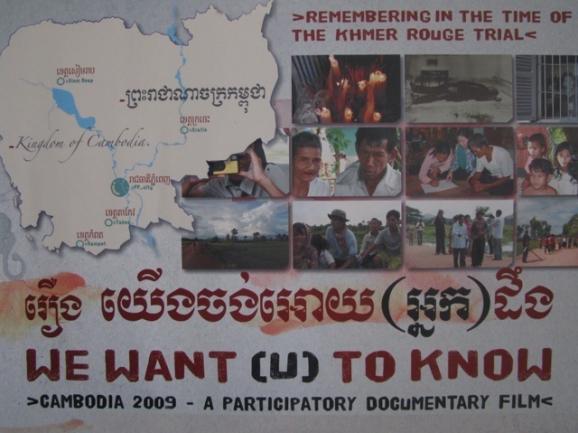Sunday night, Moviemento Kino on Kottbusser Damm screened the film, We Want (u) to Know.
The film has only been shown a handful of times in Berlin
theaters, which means if you want to see it, you have to keep your eyes
open.
We Want (u) To Know is a participatory documentary
film not originally for the Western world. Rather, the intended
audience is Cambodian, and the film has been used over the last couple
of years by NGO's and outreach programs to teach villagers about the
Khmer Rouge regime and about the country's ongoing Khmer Rouge tribunal.
The Khmer Rouge (KR) was a communist organization lead by Pol Pot
who wanted to make Cambodia completely self-sufficient by rebuilding
the country from the ground up, starting at what they called "Year
Zero." On April 17th, 1975, the Khmer Rouge soldiers defeated
the oppositional American-backed Lon Nol soldiers and fought their way
into Phnom Penh. Within a number of hours, they emptied the capital and
forced all its citizens into the countryside.
Survivors recount harrowing stories of patients being evacuated
from hospitals, IV's still in their arms, children crying for their
parents who had been lost in the commotion, and the frightening and
mysterious KR pointing guns at anyone who asked questions.
The regime lasted just under four years, and it is has been
estimated that some two million people were killed or died from
starvation.
Thirty years after this traumatic event, the country is trying to heal, and the film We Want (u) To Know is one of the methods used to help survivors confront their past.
The directors, Ella Pugliese (Italy) and Nou Va (Cambodia) were
attracted to the idea of using film as a method of healing due to its
capacity to reach anyone, regardless of their ability to read or write, a
common problem in rural Cambodian villages.
They approached the town of Thnol Lok, spent a few weeks getting
to know the villagers, and once everyone felt comfortable, they handed
the cameras over to them. To reduce the risk of reopening traumatic
wounds, the directors and villagers worked closely with psychosocial
counselors.
What followed was a series of amazing and shocking events.
According to the filmmakers, the villagers were eager not only to talk
about what had happened to them, but also to re-enact their sufferings.
They wanted their traumas represented on-screen, as they happened.
However, since the production company was low-budget and didn't have
access to actors, the villagers acted out scenes themselves.
One of the most breathtaking moments of the entire film was a
scene that told the story of an old woman who everyone called
"Grandmother." During the KR regime, she was walking with her husband
and two children when KR soldiers grabbed her husband and pulled him
away from her.
She painfully remembered how she was pulling on her husband with
one hand begging him not to go and holding onto her two young children
with the other hand. The KR ordered her to stop, screaming, "Do all four
of you want to be buried in one pit?" Her husband told her that he
helped her bring the children into the world, and now it was her job to
raise them. He was then taken away by the KR.
In the documentary, "Grandmother" directs the actors and yells
their lines from beside the camera. She watches as two young men dressed
as KR take away the man playing her husband, and she yells after them
"No! Please don't take my husband away. No!"
It's horribly sad to watch, but afterwards, "Grandmother" told
the cameras that doing the re-enactment made her happy, and more than
anything, she was pleased to have someone acknowledge her story. Other
survivors stated that once they had acted out their experience, they
could "let it go."
The desire to tell one's story is a common theme in the film.
Survivors express the need for younger generations to understand what
they went through so that past mistakes would not be repeated.
"We did this to inform the young generation of Cambodians,"
villagers repeated over and over again. They also say the film made the
younger generation finally believe their stories. As one of the
participants says, "the young generation will not believe us unless we
have evidence."
The screening was attended by the directors and a handful of
young Cambodians who had flown into Berlin just hours before and was
followed by an energized question-and-answer period.
Also present was the German lawyer, Silke Studzinsky, who has been actively involved in the genocide trials at the Extraordinary Chambers in the Courts of Cambodia (ECCC).
The court's aim is to try the topmost perpetrators of the genocide, and, to date, have only convicted one person, Kaing Guek Eav, or as more people know him, Comrade Duch,
who was the head of the KR's prison camp S-21. In 2010, he was
convicted of crimes against humanity, murder, and breaches of the Geneva
Convention.
Copyright 2012 National Public Radio. To see more, visit http://www.npr.org/.



No comments:
Post a Comment